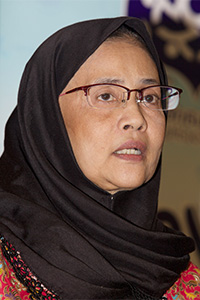
Army chief Apirat Kongsompong's recent lecture on security -- even though he may argue that it only reflects his personal views -- is controversial and has raised concerns about the military's attempts to intervene in politics. It's apparent that his perspective on national security is largely based on mistrust, with no place for people with different opinions.
More importantly, it's evident that there are no human rights and human security dimensions in the army chief's ideas about security. But as a matter of principle, national security and human security should go hand in hand. They are inseparable -- the same way citizens' rights can not be separated from political rights. I have a few issues about his lecture.
To begin with, there is a need to look into the Universal Declaration of Human Rights, which recognises the inherent dignity as well as the equal and inalienable rights of human being as the foundation of freedom, justice and peace. In most cases, the suppression of human rights values will lead to barbaric acts against the people which contradicts the conscience of mankind. The declaration also acknowledges the freedom of speech and the rights to a belief, as well as freedom from fear. The rights and freedom should not be discriminated by races, colours, languages, religions, political opinions and national, socio-economic reasons.
It's appalling that the army chief still tries to instigate -- and revive -- fear of a communist threat. For me, the phrase "Communism in Thailand" reminds me of the "Red Drum" monument in southern Phatthalung, established by local communities in commemoration of the brutal suppression of communist insurgents between 1963-1973 pursued by Field Marshal Thanom Kittikachorn's dictatorial regime.
Although local people believed that no less than 2,000 villagers were abducted, murdered and burned in the red drums, no culprits have been arrested and punished. This is one of the major cases that attest to the cruel fact about the culture of impunity in Thailand.
Gen Apirat's lecture came amid a debate over attempts to amend Section 1 of the charter. But the proposed amendment should be considered in the context of the International Covenant on Civil and Political Rights (ICCPR).
Many terms in the human rights discourse are very sensitive for Thai security personnel. They always cite concerns about sedition. For instance, the term "indigenous people" refers to a group of people who have originally resided in a land for a long time, with their own languages, culture, tradition, beliefs and religion. With several indigenous groups, Thailand is a multicultural country. But the state still fears that these indigenous people may strive for the right of self-governance. As a result, Thai authorities refrain from using "indigenous people", but instead opt for "ethnic minorities".
Such an option is against international practices, as most advanced countries in the world use the term "indigenous people" to honour these people and such terminology is a recognition of the people who originally settled on the land. Like it or not, many indigenous groups in Thailand call themselves as such to reaffirm their identities. With regard to Section 1 of the charter, several people have proposed that there should be a clause which states Thailand is "a plural-cultural nation" in order to protect the rights of various ethnic peoples in the country.
However, this proposal was wrongly interpreted as a move toward sedition or separatism. But the fact is, authorities should be aware that separatism or the establishment of a new nation cannot easily be achieved. Such a degree of separatism will come only after serious national conflict with terrible human rights violations or suppression against the people.
The establishment of any new state, like the case of East Timor, requires recognition by the UN Security Council, with two-thirds endorsement from UN member states. In this regard, state authorities must refrain from using force in violating citizens' rights, resort to torture and/or enforced disappearances in any circumstances, even if the country plunges into a war. They should also be aware that, according to international laws, amnesty is not grantable for crimes involving enforced disappearance.
Article 1 of the ICCPR states that all peoples have the right to self-determination. Although Thailand has ratified the ICCPR, however, the Thai government made interpretive declarations in respect to this article -- that "the right to self-determination" shall not be interpreted as giving permission or support to any actions leading to sedition or separatism.
In fact, the idea of our "homeland" will be more useful if all parties had the chance to share their opinions openly, without being limited to security aspects which are based on mistrust. There should be no aggression. Instead, all parties should learn to understand each other more, rather than pushing or alienating those with different ideas away, or treating them as enemies.
The military should accept freedom of speech and peaceful expression, which are not aimed at stirring up hatred or leading to violence. Those rights are enshrined by the constitution and international conventions related to human rights, of which Thailand is a party to.
With regards to Thailand's commitment to international instruments, the government must remember that all Thai citizens have the right to free expression about charter amendment, as well as the right to take part in political activities that will contribute to collective and constructive solutions. This is better than finding fault and prosecuting those with different opinions, in what is known as "strategic litigation against public participation".
